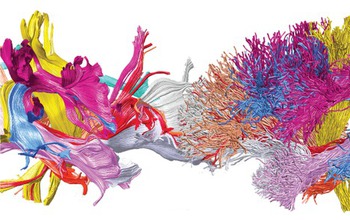News Release 16-116
Connecting data scientists with regional challenges
NSF awards $11 million to Big Data Spokes projects and associated planning activities

Researchers are working to develop methods to capture, harmonize and share neuroscience data.
September 28, 2016
This material is available primarily for archival purposes. Telephone numbers or other contact information may be out of date; please see current contact information at media contacts.
Today, the National Science Foundation (NSF) announced $10 million in awards to 10 "Big Data Spokes" projects to initiate research on specific topics identified by the Big Data Regional Innovation Hubs (BD Hubs).
Project topics range from precision agriculture to personalized education. The data spokes reflect the unique priorities and capabilities of the four BD Hubs, which represent consortia from the Midwest, Northeast, South and West of the country.
"The BD Spokes advance the goals and regional priorities of each BD Hub, fusing the strengths of a range of institutions and investigators and applying them to problems that affect the communities and populations within their regions," said Jim Kurose, assistant director of NSF's Computer and Information Science and Engineering Directorate. "We are pleased to be making this substantial investment today to accelerate the nation's big data R&D innovation ecosystem."
NSF is also making available an additional $1 million toward planning efforts and Early-Concept Grants for Exploratory Research (EAGER) awards in support of the nation's big data innovation ecosystem.
In March 2012, the Administration launched the Big Data Research and Development Initiative to improve the ability to solve some of the nation's most pressing challenges by extracting knowledge and insights from large, complex collections of digital data. The BD Hubs, announced last year, are one way NSF is addressing this need by fostering multi-sector collaborations among academia, industry and government, and bringing together a wide range of stakeholders to solve regional challenges.
Like the BD Hubs, the BD Spokes will take on a convening and coordinating role, as opposed to directly conducting research. Each will gather important stakeholders, engage end users and solution providers, and form multi-disciplinary teams to tackle questions no single field can solve alone. However, unlike the BD Hubs, which aim to span the full range of data-driven challenges and solutions in a geographic region, each BD Spoke will have a specific, goal-driven mission.
An example of the types of activities the awards will support includes an effort, led by a team from the Massachusetts Institute of Technology (MIT), Brown University and Drexel University, to develop a data licensing approach and automated platform that will allow individuals and organizations to share data. The platform will ensure that data sharing conforms to the imposed licensing restrictions. Partners on the project include Elsevier, Intel, Microsoft Research, Oracle, Rhode Island Hospital and Thomson Reuters.
"The Big Data Hub and Big Data Spokes have been a great way to connect those of us working in Big Data in the Northeast," said Samuel Madden, professor of Electrical Engineering & Computer Science at MIT and a principal investigator on the project. "As a computer scientist focused on software for sharing data, I've been able to connect to a diverse group of researchers and leaders interested in a wide range of broader issues, ranging from hardware infrastructure to software architectures to the legal, ethical, and societal implications of data sharing."
Another project, led by Gari Clifford, associate professor of Biomedical Informatics at Emory University, will investigate how to use data from diverse sources, including fitness trackers and environmental monitors, to improve patient care. As its first pilot, the project will focus on African-Americans and Latinos diagnosed with cardiovascular disease. Partners include Amazon, Emory Critical Care Center, Cerner, Relus Technologies and the University of Texas Southwestern Medical Center.
The 10 BD Spokes projects are:
- NORTHEAST: A Licensing Model and Ecosystem for Data Sharing (MIT, Brown University, Drexel University)
- NORTHEAST: Grand Challenges for Data-Driven Education (University of Massachusetts, Amherst; Worcester Polytechnic Institute; University of Pennsylvania)
- NORTHEAST: Integration of environmental factors and causal reasoning approaches for large-scale observational health research (Harvard University, Columbia University, University of Pittsburgh, Pennsylvania State University)
- SOUTH: Large-scale Medical Informatics for Patient Care Coordination and Engagement (Emory University)
- SOUTH: Smart Grids Big Data (Texas A&M, Temple University, Georgia Institute of Technology)
- SOUTH: Using Big Data for Environmental Sustainability: Big Data + AI Technology = Accessible, Usable, Useful Knowledge (Georgia Institute of Technology, Smithsonian Institution)
- MIDWEST: Advanced Computational Neuroscience Network (University of Michigan, Indiana University, Ohio State University, Case Western University)
- MIDWEST: Digital Agriculture - Unmanned Aircraft Systems, Plant Sciences and Education (University of North Dakota)
- WEST: Accelerating and Catalyzing Reproducibility in Scientific Computation and Data Synthesis (Arizona State University)
- WEST: MetroInsight: Knowledge Discovery and Real-time Interventions from Sensory Data Flows in Urban Spaces (University of California, San Diego; University of California, Los Angeles; Arizona State University)
Among the planning grants being announced today, Robin Gandhi from the University of Nebraska Omaha will investigate how Big Data can be used to improve America's infrastructure, starting with sensors on bridges. Abani Patra from the University at Buffalo will lead a collaboration to spur innovations in the energy sector using Big Data. The full list of planning projects is as follows:
- NORTHEAST: Big Data Literacy: Building Capacity for Regional Collaboration in Closing the Big Data Divide (New York Hall of Science)
- NORTHEAST: Cross-Organization Big Data Cyber Attack Awareness (Pennsylvania State University)
- NORTHEAST: Planning for Privacy and Security in Big Data (Rutgers University, Pennsylvania State University)
- NORTHEAST: Partnerships for Energy Cycle Innovation through Big Data (PPEID) (University of Buffalo)
- SOUTH: Rare Disease Observatory (North Carolina State University, University of North Carolina)
- MIDWEST: Big Data Innovations for Bridge Health (University of Nebraska)
- MIDWEST: Cyberinfrastructure to Enhance Data Quality and Support Reproducible Results in Sensor Originated Big Data (Purdue University)
- MIDWEST: Networked Resilience of Communities Facing Natural and Social Emergencies (University of Illinois at Urbana-Champaign)
- WEST: Big Data for Policing in the Western United States (Boise State University)
- WEST: Increasing collaborations in proteogenomics applications of genetic data (Institute for Systems Biology; University of California, San Diego)
The BD Hubs and Spokes programs are part of a larger effort at NSF to advance data science and engineering. In Fiscal Year 2017, NSF will invest more than $110 million in Big Data research.
-NSF-
-
Uses of Big Data in smart grids.
Credit and Larger Version -
Researchers collecting data from aging infrastructure.
Credit and Larger Version -
The Big Data Regional Innovation Hubs cover all 50 states.
Credit and Larger Version
Media Contacts
Aaron Dubrow, National Science Foundation, (703) 292-4489, email: adubrow@nsf.gov
Program Contacts
Fen Zhao, National Science Foundation, (703) 292-7344, email: fzhao@nsf.gov
Related Websites
Midwest Big Data Hub: http://midwestbigdatahub.org/
West Big Data Innovation Hub: http://westbigdatahub.org/
Northeast Big Data Innovation Hub: http://nebigdatahub.org/
South Big Data Regional Innovation Hub: http://SouthBigDataHub.org
Establishing a brain trust for data science: https://www.nsf.gov/news/news_summ.jsp?cntn_id=136784
Big Data Regional Innovation Hubs: Establishing Spokes to Advance Big Data Applications (BD Spokes): https://www.nsf.gov/funding/pgm_summ.jsp?pims_id=505264
The U.S. National Science Foundation propels the nation forward by advancing fundamental research in all fields of science and engineering. NSF supports research and people by providing facilities, instruments and funding to support their ingenuity and sustain the U.S. as a global leader in research and innovation. With a fiscal year 2023 budget of $9.5 billion, NSF funds reach all 50 states through grants to nearly 2,000 colleges, universities and institutions. Each year, NSF receives more than 40,000 competitive proposals and makes about 11,000 new awards. Those awards include support for cooperative research with industry, Arctic and Antarctic research and operations, and U.S. participation in international scientific efforts.
Connect with us online
NSF website: nsf.gov
NSF News: nsf.gov/news
For News Media: nsf.gov/news/newsroom
Statistics: nsf.gov/statistics/
Awards database: nsf.gov/awardsearch/
Follow us on social
Twitter: twitter.com/NSF
Facebook: facebook.com/US.NSF
Instagram: instagram.com/nsfgov



